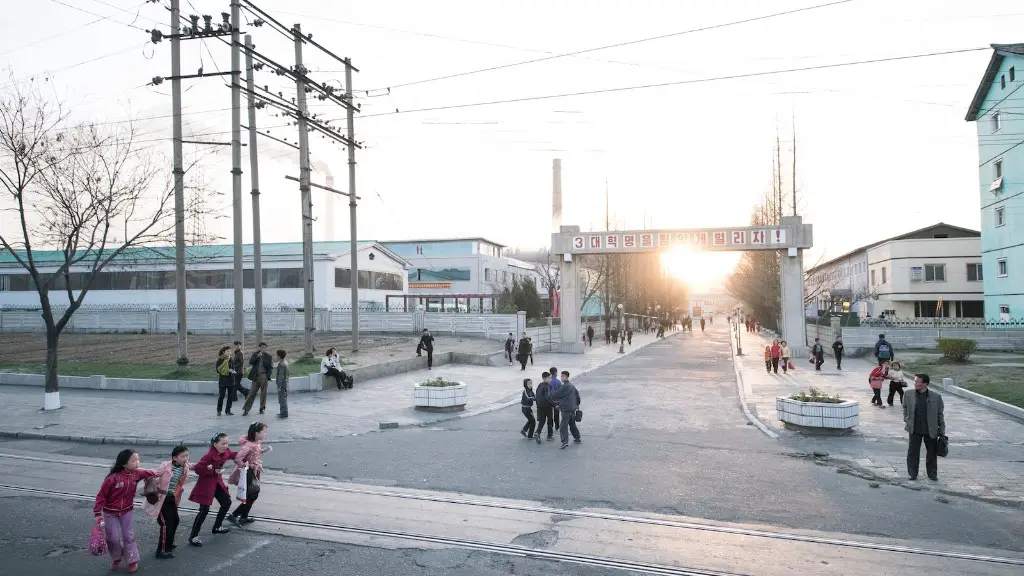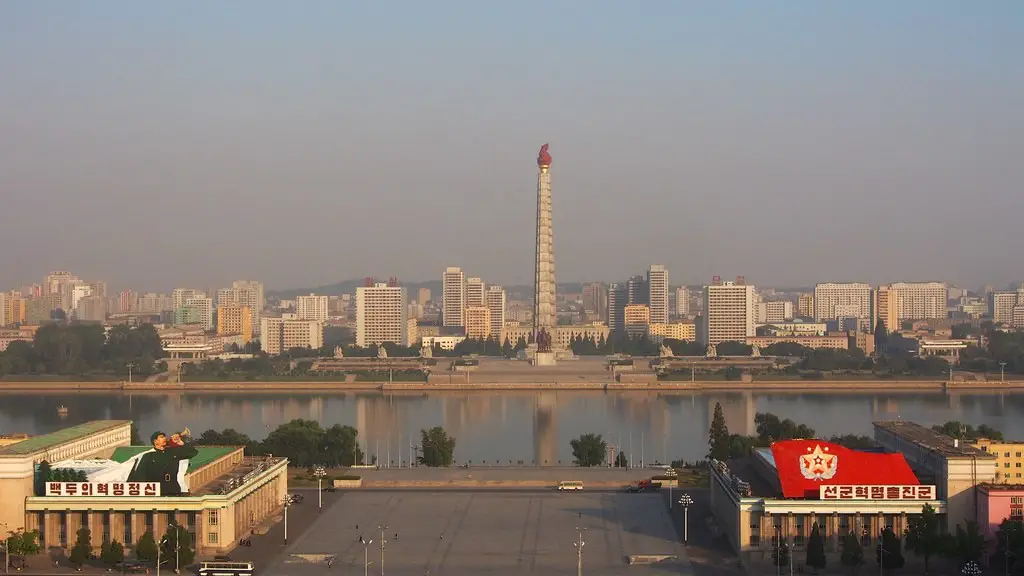Background
The Korean peninsula comprises of two countries – North Korea and South Korea. North Korea was formed in 1948, when the Soviet Union and China declared the formation of the Democratic People’s Republic of Korea. South Korea was formed in 1948 in the same region, with the backing of the United States of America. Since then, the two countries have remained in a state of political and military conflict.
Although there are many potential causes underlying the split between North and South Korea, the main one is linked to the end of World War II. When the war ended in 1945, the region was divided in half along the 38th parallel line, with the Soviet Union occupying the northern half and the United States occupying the southern half. This set the stage for two separate political systems and ideologies to develop, one under the influence of the Soviet Union (North Korea) and one under the influence of the United States (South Korea).
Political Partnerships
In 1948, North Korea was proclaimed a communist-style government by the Soviet Union. The United States quickly reacted by setting up a government in South Korea that was committed to democracy and capitalism. This decision to establish different political systems on either side of the peninsula exacerbated the differences between the two countries.
In 1950, North Korea invaded South Korea, sparking the Korean War. The war lasted for three years, with devastating losses on both sides. Afterwards, it became clear that the two countries were completely unable to reunify, and the line of demarcation was made permanent.
Growing Ideological Differences
In the decades following the Korean War, both North and South Korea experienced unprecedented economic growth. South Korea embraced a market-based economy and democratic political system, while North Korea remained secretive and authoritarian. Over time, the differences between the two countries grew even larger, and today they have become two completely separate nations with little in common apart from a shared history and language.
Continued Tension
Although the two countries are technically in a state of truce, the border is heavily militarized and tensions between them remain high. There have been several attempts to engage in dialogue, but so far none have been successful.
Economic Disparity
One of the most notable distinctions between North and South Korea is their level of economic development. South Korea has a highly developed economy and is one of the most prosperous countries in Asia. In comparison, North Korea is one of the poorest countries in the world. It is estimated that the per capita GDP of South Korea is around 8 times that of North Korea. This stark contrast in incomes is one of the reasons why the two countries remain separate.
Human Rights Crisis
In North Korea, the government has taken extreme measures to control its population. It is estimated that up to 200,000 people are currently held in labour camps, where they are subjected to torture and forced labor. In addition, the population of North Korea suffers from food shortages, lack of access to medical care, and restrictions on freedom of speech and expression. At the same time, South Korea has achieved a high degree of economic and political stability, making it a beacon of democracy in the region.
Military Threats
On top of the economic and political differences between the two countries, there is a continuous and growing military threat from North Korea. In recent years, the nation has conducted missile tests and made various threatening statements aimed at South Korea and its allies. In response, South Korea has increased its military presence along the border in order to deter any potential attack.
The United Nations
While the UN has acted as a mediator in the past, its role in the current dispute between North and South Korea is limited. The organization has put in place a few diplomatic measures such as the maintenance of a demilitarized zone and implementation of sanctions against North Korea. However, the organization has been unable to address the underlying causes of the conflict, and it remains to be seen if the UN can play a more effective role in the future.
Role of Surrounding Nations
The countries in the region have also been involved in the dispute between North and South Korea. China, which borders both countries, has sought to keep the peace by calling for dialogue and engaging in diplomatic efforts. For its part, the United States has maintained a strong military presence in South Korea, while also engaging in talks with North Korea in an effort to reduce tensions and reach an acceptable solution.
Economic Co-operation
In recent years, there have been several attempts to increase economic cooperation between the two countries. This includes joint business ventures and the establishment of special economic zones to facilitate the movement of goods and services between the two nations. However, these efforts have been met with resistance, as North Korea continues to reject offers of economic assistance from the South.
Political Solutions
The only way for the two countries to reunite is through a political process. This process requires the key parties to come together and negotiate a solution. In the past, such negotiations have been unsuccessful, but there is hope that one day a meaningful dialogue can be achieved and a lasting peace reached.
Conclusion
The split between North and South Korea has been driven by a number of factors, including political differences, economic disparity, and continued military threats. In the absence of a political solution, the two countries remain divided, and tensions between them remain high. To move forward, it is vital that the key stakeholders come together to negotiate a lasting solution that meets the needs of both nations.



